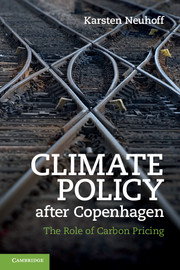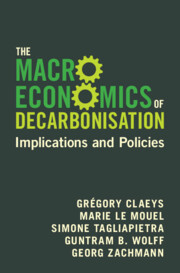Climate Policy after Copenhagen
At the UN Climate Negotiations in Copenhagen, 117 heads of state concluded that low-carbon development is necessary in order to combat climate change. However, they also understood that transition to a low-carbon economy requires the implementation of a portfolio of policies and programs - a challenging endeavour for any nation. This book addresses the need for information about factors impacting climate policy implementation, using as a case study one effort that is at the heart of attempts to create a low-carbon future: the European Emission Trading Scheme. It explores problems surrounding the implementation of the ETS, including the role of vested interests, the impact of design details and opportunities to attract long-term investments. It also shows how international climate cooperation can be designed to support the domestic implementation of low-carbon policies. This timely analysis of carbon pricing contains important lessons for all those concerned with the development of post-Copenhagen climate policy.
- Explains the economics of carbon pricing without using equations so that the book is more accessible to a broader set of actors
- Uses the example of the EU Emissions Trading Scheme to explore the politics, design and implementation of climate policy instruments
- Explores financial mechanisms to encourage/facilitate south-north cooperation and the links between domestic policy implementation and international cooperation
Reviews & endorsements
"Karsten Neuhoff makes an interesting case in showing that the failure to adopt a comprehensive climate agreement in Copenhagen may have been the result of some fundamental underlying changes. The Copenhagen Accord could therefore mark the beginning of a bottom-up approach in which domestic policy design based on carbon pricing as well as specific regulations can be supported through international co-operation. If his analysis proves right, the EU is in principle well equipped to such a change, but may have to rethink some elements of its international negotiation strategy accordingly." - Jos Delbeke, Director-General for Climate Action, European Commission
Product details
July 2011Paperback
9781107401419
296 pages
227 × 152 × 13 mm
0.47kg
47 b/w illus. 5 tables
Available
Table of Contents
- List of figures
- List of tables
- List of text boxes
- 1. Introduction
- 2. The role of a climate policy mix
- 3. Implementing a carbon price, the example of cap and trade
- 4. Shifting investment to low-carbon choices
- 5. Co-operation among developed countries - a role for carbon markets?
- 6. A world of different carbon prices
- 7. International support for low-carbon growth in developing countries
- 8. Conclusion
- References
- Index.





